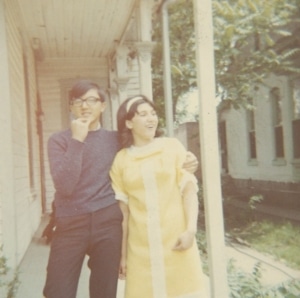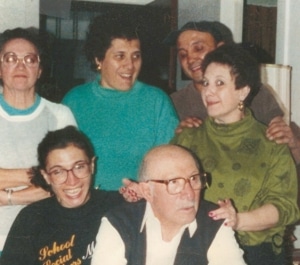DCPA NEWS CENTER
Enjoy the best stories and perspectives from the theatre world today.
Enjoy the best stories and perspectives from the theatre world today.
 Frances Torres calls the first 19 years of her life, when she lived in the West Denver neighborhood of Auraria, the most developmental. Growing up in that Old Westside community as daughter of the Mayor of 9th Street shaped the value she has always placed on education, influenced her career and formed the foundation of her spirituality. Those times, and that community, also set her up to share.
Frances Torres calls the first 19 years of her life, when she lived in the West Denver neighborhood of Auraria, the most developmental. Growing up in that Old Westside community as daughter of the Mayor of 9th Street shaped the value she has always placed on education, influenced her career and formed the foundation of her spirituality. Those times, and that community, also set her up to share.
The youngest in a large, multigenerational family, Torres was always surrounded by a lot of people – not all of them related. “The families I grew up around, they were multigenerational like mine. They knew me from my family. They knew what I represented. When you walked past someone’s house and they were out on the porch, you said ‘hi,’ they said ‘hi.’ People trusted you. If you were walking fast, you might be doing something you shouldn’t be doing, and they would call you on that, but they wouldn’t shout at you for running through their yard. The safety and mobility we had gave us some kind of ownership. We were part of a community.”
Bounded by West Colfax Avenue, the South Platte River and Speer Boulevard, Auraria was a diverse neighborhood akin to a small town, and from Torres’ perspective, formed of hardworking people who never received enough credit for who they were or what they accomplished.
They saw us as second-class citizens. They didn’t know we went downtown and had jobs there. A lot of the women worked at Mountain Bell. We had schools and education. There was mixed zoning. There were storefronts. People selling things. Even people who sold from the back of a truck. We always had a fruit man. For a very long time there was the ice man, too.
Torres recalls understanding even as a young person that the community’s infrastructure was falling apart through lack of investment. The homes were aging, but because of Redlining, refinancing was not an option. Still, many saw beauty there, including Torres’ parents, Phillp and Petra. In the 1930s, they bought the house at 1033 9th Street, where five of Torres’ older siblings were born. They were among 7,000 babies delivered by a doctor right out of city history: Justina Ford. When authorities refused to give Denver’s first licensed black woman physician privileges at the city’s hospital, Ford treated patients in her home, paid house calls to immigrants, people of color and other underserved patients for 50 years.
Torres recalls that kind of persistence all around her. Her own father was among those who will never appear in history books but helped bring about the first Spanish-language church services in Denver. Together, they helped get the original St. Cajetan’s Catholic Church built on the Westside to serve their community. And when the community needed access to banking, to loans and investment options, her father helped found St. Cajetan’s Credit Union.
I’m a social worker by profession. I was taught by family that community is really important. There’s a difference when you see it and when you experience it. We definitely had our issues, but there was a basic sense of belonging and sharing.
For decades now, Torres has carried that beyond her profession and been among those advocating for Displaced Aurarians to be remembered and acknowledged. Since 2022, she has served on the Auraria Historical Advocacy Council and says the Displaced Aurarian Scholarship is what has kept her on the campus.
 The program was designed to provide funds for tuition and fees for undergraduate and graduate students who had been residents of the Auraria neighborhood between 1955 and 1973, before the Auraria Campus was constructed. The scholarship was also available to their children and grandchildren. From 1988 through 2021, more than 600 people received Displaced Aurarian Scholarships. Torres was not among them.
The program was designed to provide funds for tuition and fees for undergraduate and graduate students who had been residents of the Auraria neighborhood between 1955 and 1973, before the Auraria Campus was constructed. The scholarship was also available to their children and grandchildren. From 1988 through 2021, more than 600 people received Displaced Aurarian Scholarships. Torres was not among them.
“I never got it. None of my siblings did. The way it was formed was never concrete or legislated.” That finally changed in 2021, when the program expanded to include all direct descendants of Displaced Aurarians in perpetuity. “But there’s still so much more to do.”
AHAC hopes to open a welfare center to help students establish lineage. “We don’t want a social club. We want students to figure out their scholarship things and get them on the lineage so it’s for all generations. I wish everybody could go to college. We have to keep the scholarship alive.”
